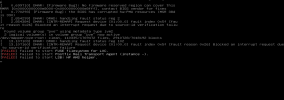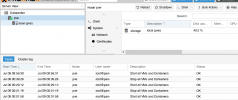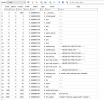Hi,
I have a server with Raid 5/6 configuration. After a normal physical cleanup, two of my disks failed and the RAID controller automatically started rebuilding on a spare drive. Raid 5/6 can handle 2 failed drives so i was not worried. The first reboot I could reach the web interface. To verify that the disks are irreparable i rebooted the server.
After the reboot i saw the message that the web interface would be reachable etc. but it wasn't. Instead i got about 7 errors thrown repeated all 5 seconds. The error was like
or
I was woundering why I get errors now when the first reboot was successful so i initiated an ACPI signal to shut down the server. Nothing happened so I forced an ILO cold reboot.
After this third reboot i got a prompt like described here: https://forum.proxmox.com/threads/why-do-i-get-pve-root-needs-manual-fsck-at-initramfs.104829/ I ran
and confirmed everything with yes. After that I exited the shell and the reboot continued. Now the "ext4-fs error ... ext4_lookup:1785 ... checksum invalid" is not there anymore but i still have no web interface.
I was able to login via ILO remote console now and looked for the webserver. It seems running only on IPv6 which i cant explain (config broken but still readable?). Other services are running reachable on IPv4 (f.x. the HP smart storage administrator here on port 2381)

I am really worried now what i can do and what i shouldn't do so I want ask you for tips how to solve this problem and not making it bigger :/...
Any ideas?
Edit: This is what i get directly before the login prompt:

I have a server with Raid 5/6 configuration. After a normal physical cleanup, two of my disks failed and the RAID controller automatically started rebuilding on a spare drive. Raid 5/6 can handle 2 failed drives so i was not worried. The first reboot I could reach the web interface. To verify that the disks are irreparable i rebooted the server.
After the reboot i saw the message that the web interface would be reachable etc. but it wasn't. Instead i got about 7 errors thrown repeated all 5 seconds. The error was like
Code:
ext4-fs error ... ext4_lookup:1785 ... rs:main Q:Reg: iget: checksum invalid
Code:
... pmxcfs: iget: checksum invalidAfter this third reboot i got a prompt like described here: https://forum.proxmox.com/threads/why-do-i-get-pve-root-needs-manual-fsck-at-initramfs.104829/ I ran
Code:
fsck -c /dev/mapper/pve-rootI was able to login via ILO remote console now and looked for the webserver. It seems running only on IPv6 which i cant explain (config broken but still readable?). Other services are running reachable on IPv4 (f.x. the HP smart storage administrator here on port 2381)

I am really worried now what i can do and what i shouldn't do so I want ask you for tips how to solve this problem and not making it bigger :/...
Any ideas?
Edit: This is what i get directly before the login prompt:

Last edited:



